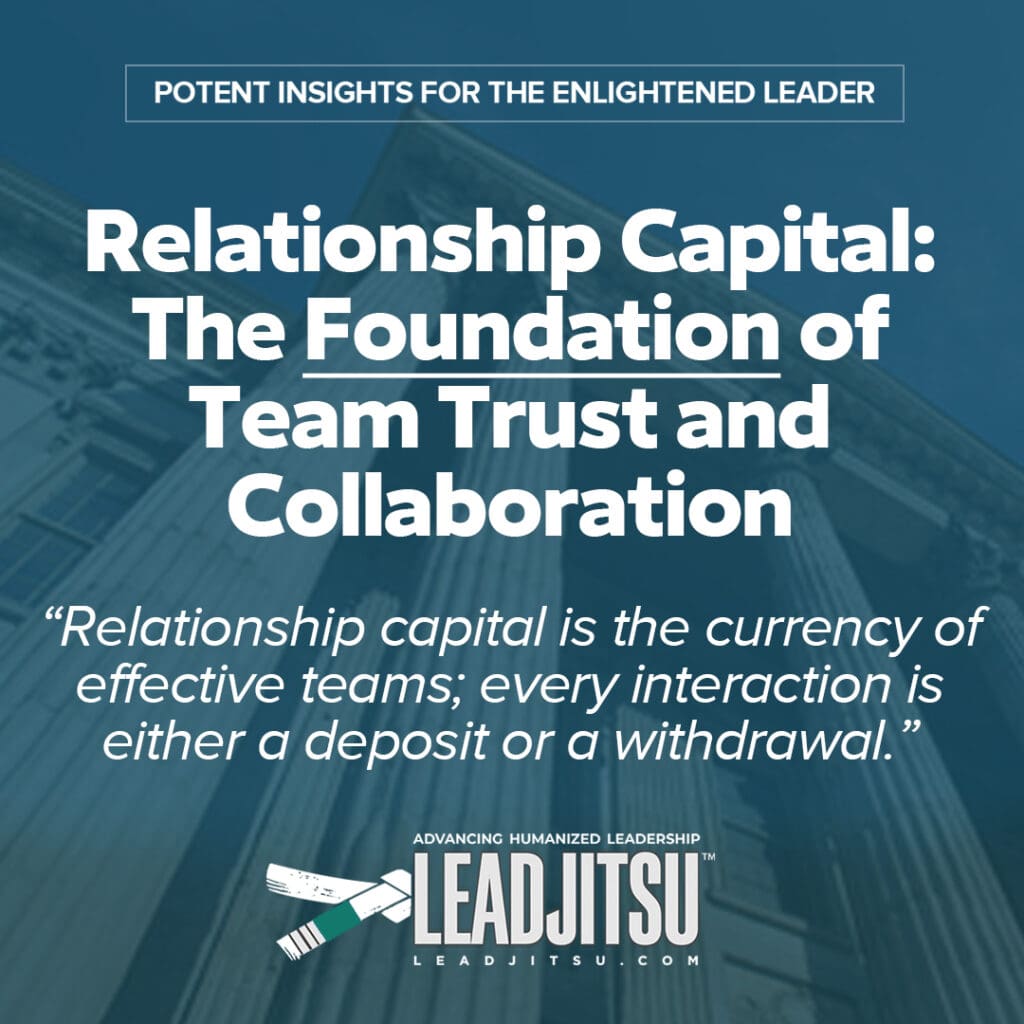Success often hinges not only on technical skills and expertise but also on the strength of our relationships. Relationship capital—the value of building meaningful, trust-filled connections with colleagues, team members, and clients—can be a powerful driver of productivity, engagement, and long-term success. Just like financial capital, relationship capital requires regular “deposits” to grow, while “withdrawals” can weaken its foundation.
What is Relationship Capital?
Relationship capital is the accumulated trust, respect, and goodwill you build with others through positive interactions, support, and open communication. It’s the level of social equity you hold in a workplace, built gradually through everyday actions that communicate care, respect, and understanding. When relationship capital is high, colleagues work together more seamlessly, morale is lifted, and challenges are approached with a team-first attitude. Conversely, low relationship capital can lead to miscommunication, low morale, and a lack of trust, making work feel like an uphill battle.
To maintain and grow relationship capital, it’s essential to understand the concept of deposits and withdrawals—the daily actions that either strengthen or diminish the relationships that make up the fabric of a thriving workplace.
Relationship Capital Deposits: Building Bonds of Trust and Respect
Deposits are positive actions that enhance trust and reinforce mutual respect. These gestures, big or small, show that we value our relationships and are invested in creating a supportive environment. Here are some key ways to make meaningful deposits into your relationship capital:
Acts of Kindness and Encouragement Simple acts of kindness can make a lasting impact. From showing appreciation for a job well done to offering encouragement during challenging times, these gestures signal respect and genuine care. A quick “thank you” or a note of appreciation can remind someone that they are valued, boosting morale and strengthening bonds.
Consistent and Transparent Communication Open, honest, and transparent communication fosters trust. By consistently keeping others informed and listening actively, we communicate that we respect their time and input. Transparent communication builds confidence and demonstrates that you are someone who can be trusted with both small and large matters.
Supporting Professional Growth and Development Investing in others’ growth, whether through mentorship, offering learning opportunities, or sharing resources, is a powerful way to build relationship capital. It shows that you are committed to others’ success and value their potential within the team.
Offering Help When Needed Proactively offering assistance, even before being asked, is a strong deposit in the relationship capital bank. By being there for colleagues during high-stress moments or when they are dealing with tight deadlines, you establish yourself as a reliable team player who is invested in the success of others.
Honoring Commitments Following through on promises and commitments is essential for trust. Each time you keep your word, you reinforce a foundation of reliability and respect, showing others they can count on you.

Relationship Capital Withdrawals: Actions that Diminish Trust
Just as deposits build relationship capital, withdrawals reduce it. Withdrawals occur when actions or behaviors create friction, decrease trust, or erode respect. Here are some examples of common withdrawals in the workplace and their effects:
Poor Communication or Lack of Transparency Withholding information or failing to communicate clearly creates misunderstandings, leaving others feeling undervalued or even betrayed. Lack of transparency can lead to mistrust, as team members may feel like they’re left out of the loop on important matters.
Breaking Promises or Failing to Follow Through Not following through on commitments, whether intentionally or not, signals to others that they cannot rely on you. This erodes trust and can create resentment, especially if broken promises impact project timelines or team goals.
Negative or Disrespectful Behavior Criticizing others harshly, dismissing their ideas, or treating them with disrespect are significant withdrawals. These behaviors damage morale and can lead to a toxic work environment where people feel hesitant to share or collaborate.
Taking Credit for Others’ Work Failing to acknowledge others’ contributions or taking credit for their work can deeply harm relationships, as it conveys a lack of respect and honesty. This action can create long-lasting mistrust and resentment among team members.
Ignoring or Downplaying Others’ Contributions When leaders or colleagues overlook the efforts of others or fail to recognize hard work, it signals a lack of appreciation. This can lead to disengagement, as team members may feel their contributions are undervalued.
Balancing Deposits and Withdrawals: The Path to Strong Relationship Capital
Building strong relationships at work is about finding the right balance. Too many withdrawals without corresponding deposits will quickly drain relationship capital, resulting in a tense and unproductive environment. Conversely, regular deposits strengthen relationships and provide a buffer that helps navigate occasional missteps or misunderstandings.
To create a positive balance, consider the Three R’s of Relationship Capital:
Recognize: Acknowledge the importance of relationship capital as a key element in team success. View every interaction as an opportunity to make a deposit or avoid a withdrawal.
Reciprocate: Show appreciation and respect in response to the efforts of others. When someone makes a deposit in the relationship, reciprocate to keep the momentum going.
Reflect: Regularly assess your own actions and the state of your workplace relationships. Are you making more deposits or withdrawals? Reflection allows you to identify areas where you can improve your relationship-building efforts.
LEADJITSU Ignite Leadership Team Intensive
In the pursuit of humanized leadership, it’s not just about leading individually—it’s about creating a unified, thriving team. The LEADJITSU Ignite Leadership Team Intensive is a transformative six-month journey designed to harmonize your leadership team around core principles of respect, inclusivity, and communication. This program fosters a culture where leaders and their teams grow together, embracing a shared vision and driving sustainable success.
Empower your team to lead with heart, purpose, and unity. Let’s ignite this journey together. Schedule a complimentary consultation.
LEADJITSU Strategies for Building Relationship Capital
At LEADJITSU, we focus on humanized leadership practices that encourage positive interactions and intentional relationship-building. Here are two LEADJITSU-inspired trust-building activities to cultivate relationship capital in your team:
1. Relationship Deposits Practice
This exercise encourages team members to actively recognize and make small deposits in each other’s relationship accounts. Set aside time each week where team members can publicly or privately acknowledge and thank others for their contributions. This simple habit fosters a supportive environment and helps everyone feel valued.
2. The “Repair and Reconnect” Session
Even with the best intentions, occasional withdrawals are inevitable. This session provides a structured time for team members to address issues that may have caused relationship withdrawals. Leaders can facilitate a session where team members discuss recent misunderstandings or conflicts, allowing each person to express how they were impacted. Together, the team can discuss how to move forward with respect and transparency, making intentional deposits to rebuild any trust that may have been lost.
Building Lasting Relationship Capital
In the end, relationship capital is a long-term investment in the success of any organization. By consistently making deposits and being mindful of potential withdrawals, leaders and team members can build a positive, collaborative workplace where everyone feels valued and motivated. The key lies in recognizing that every interaction, no matter how small, contributes to the overall balance of relationship capital.
By incorporating LEADJITSU principles and committing to the Three R’s—Recognize, Reciprocate, and Reflect—leaders and employees alike can cultivate a culture of trust and mutual respect. This isn’t just good for relationships; it’s essential for fostering productivity, engagement, and innovation within teams.
If you’re ready to enhance your team’s relationship capital and create a workplace where everyone can thrive, consider implementing these strategies or reach out to explore how LEADJITSU training can transform your organization’s culture.
Start building the trust that powers your team forward today.
Ask about our Strengthening Relationships Workshop!



